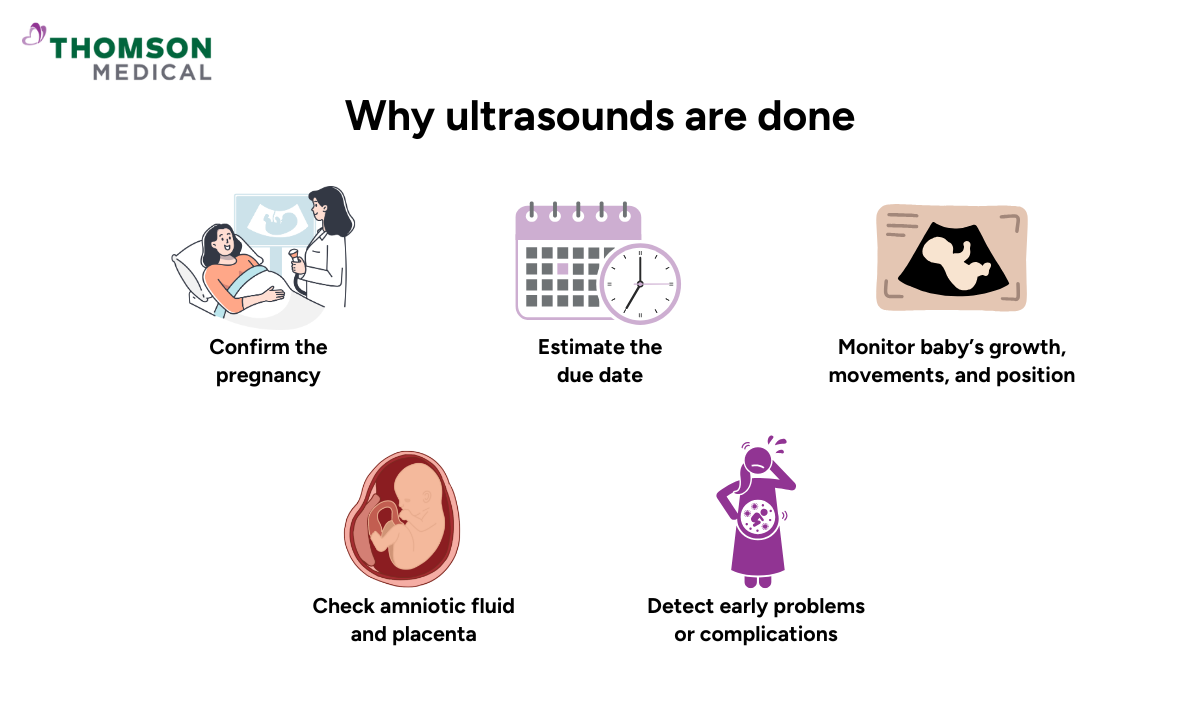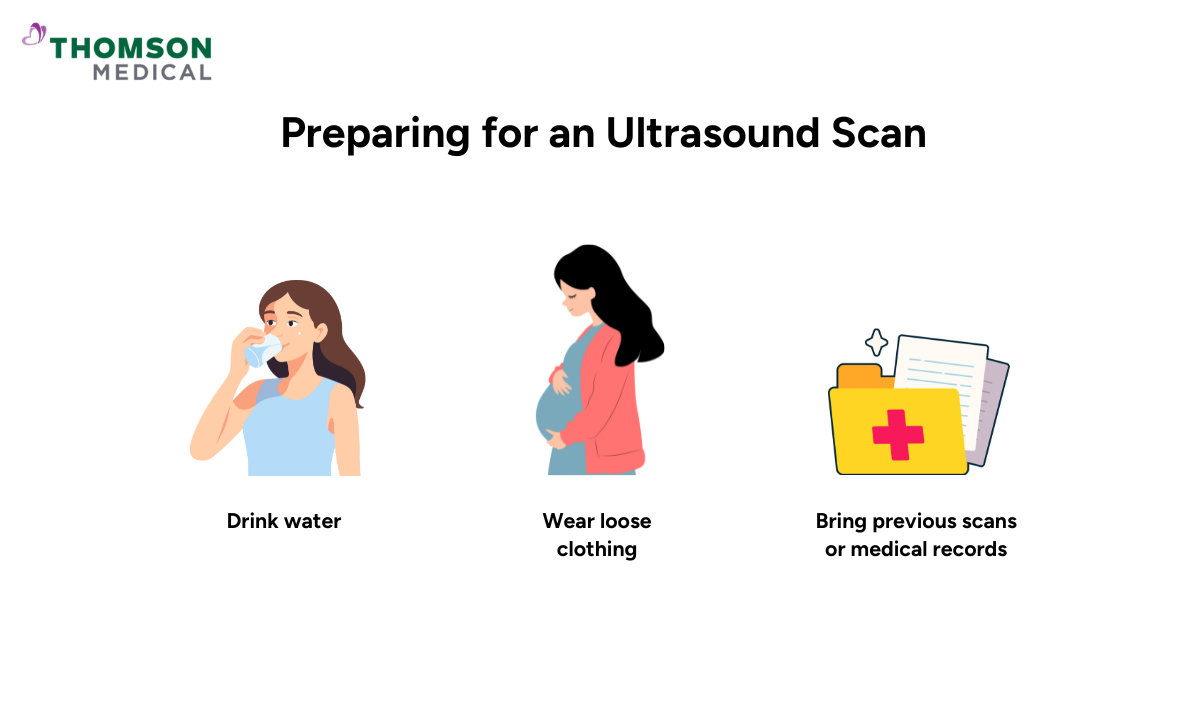Naturally, as a parent, the first time you see your baby in the womb brings a sense of excitement and, simultaneously, relief. An ultrasound scan during pregnancy gives the parents and doctors a detailed view of how your baby is growing. Ultrasound is safe to check the growth, the baby’s organs, and to minimise potential issues, including foetal anomalies.
From the first appearance of the yolk sac to the third trimester, these scans give doctors and parents a preview of what to expect and peace throughout the whole pregnancy journey.
What is a pregnancy ultrasound scan?
We cannot see a baby in the mother’s womb with the naked eye, which is why ultrasound is used. Ultrasound is a high-frequency sound wave used during pregnancy to generate images of your womb, the developing baby, the placenta, and the amniotic fluid. These real-time photos display your baby's position, movements, and heartbeat. It is safe for both mother and child because it doesn't use radiation like X-rays do.
During early pregnancy, the yolk sac is visible on an ultrasound, which helps doctors confirm that a pregnancy is developing in your womb.
The role of the yolk sac
The yolk sac is a key structure that the doctor will look for in early scans. This tiny structure develops during pregnancy to provide nutrients and help create your baby’s first blood cells before the placenta is fully developed. The presence of a normal yolk sac during an ultrasound scan is generally considered a reassuring indicator.
Why do you need an ultrasound scan during pregnancy?

Ultrasound scans are important to monitor your baby’s growth and to detect any potential issues early. The scans help to:
Confirm your pregnancy
Estimate your due date
Monitor baby’s growth, movements, and position
Check the amniotic fluid levels and placenta location
Detect early potential foetal anomalies or other complications
Each scan also marks important ultrasound milestones for both medical monitoring and parental reassurance. The World Health Organisation says pregnant people should have at least one ultrasound before 24 weeks to check how far along the pregnancy is, make sure the baby is developing normally, and see if there is more than one baby.
What conditions can be detected during the scan?
During pregnancy, an ultrasound scan can identify a number of conditions:
Structural concerns in your baby, such as the heart, spine, or brain
A baby with growth restriction and smaller than expected
Issues with the placenta, including placenta previa
Multiple pregnancies, such as twins or triplets
Chromosomal conditions, which can occasionally be identified by markers
Detecting these issues early means your doctor can provide the right care and support for both you and your baby.
For personalised advice about your pregnancy and ultrasound needs, specialist obstetric care is available at Thomson Medical. Request an appointment to consult your concerns.
Common types of ultrasound scans during pregnancy
Throughout your pregnancy, you will be offered different types of ultrasound scans. Each scan has its own purpose, helping to monitor your baby’s growth and wellbeing while giving you reassurance along the way.
Dating scan
Around weeks 6 to 12, a dating scan can provide reassurance by confirming your pregnancy and estimating your due date. It may also show if you’re expecting more than one baby, giving you an early glimpse of your growing family.
Nuchal translucency scan
Usually offered between weeks 11 and 14, this scan gently examines the fluid at the back of your baby’s neck. It helps screen for certain conditions, such as Down syndrome, and gives you early insights into your baby’s development.
Transvaginal ultrasound
In the earliest weeks of pregnancy, a transvaginal ultrasound can give a clear view of your uterus, cervix, embryo, and yolk sac. The procedure involves a small, gentle probe, providing detailed images that help reassure you about your baby’s early growth.
Doppler ultrasound
During the third trimester, a Doppler ultrasound may be used to check your baby’s blood flow and ensure they’re getting enough oxygen and nutrients.
Abdominal ultrasound
The most commonly used type, an abdominal ultrasound shows your baby’s position, movements, and heartbeat. With the probe gently moved across your abdomen, many parents find this scan to be one of the most joyful and memorable moments of pregnancy.
Foetal growth scan
Later in pregnancy, a growth scan helps your healthcare team check that your baby is developing as expected. Seeing your baby’s size, weight, and movements can reassure you that they’re thriving, while also giving important information about placental health.
Morphology (anomaly) scan
Between weeks 18 and 22, this detailed scan examines your baby’s organs, limbs, spine, and brain. While its main purpose is to detect potential anomalies, it can also be a deeply reassuring opportunity to see your baby growing and developing.
How to prepare for an ultrasound scan during pregnancy?

If you are a mother, especially a first-time mother, preparing for an ultrasound scan helps ensure clear images and, most importantly, a smoother experience. Proper preparation can make it easier to see important details, such as your baby’s position, the placenta, and the yolk sac in early scans.
Being ready also reduces stress and allows the appointment to run efficiently, giving both you and your healthcare team the most accurate information. Some tips you can follow are:
Drink water before early abdominal ultrasound scans to improve visibility. When the bladder is full, the uterus and colon are forced aside, giving the ultrasound waves a clear, unhindered view of your baby.
Wear loose clothing to make it easier to see your belly.
Bring any prior scan results or medical records for reference.
What to expect during an ultrasound scan during pregnancy?
For an abdominal ultrasound, you will lie on a couch while gel is spread across your stomach. The sonographer (who uses imaging equipment to produce pictures of the interior of the body for diagnosis) moves a probe across your skin to capture images. You may see your baby’s heartbeat or movements.
If it is an early pregnancy, a transvaginal scan may be used. A small probe is gently inserted into your vagina to get detailed images of your uterus, cervix, and yolk sac.
When will you get the results?
Following the scan, basic findings are frequently presented immediately. Depending on the clinic, a complete report is typically accessible within a day or two. After reviewing the pictures, your doctor will discuss any concerns with you.
Our obstetrics and gynaecology specialists
Loading...
Is it safe to do the scan every month during pregnancy?
When performed by qualified professionals, ultrasound scans during pregnancy are considered safe. Instead of using radiation, they use sound waves. Most doctors advise scans only when absolutely necessary to minimise stress and expense, although some parents request repeated scans for reassurance.
What to expect at each ultrasound?
Each ultrasound marks an important milestone in your pregnancy. These scans not only guide your doctor in monitoring your baby’s development but also give you reassurance along the way:
5–6 weeks:
You’ll usually see the first signs of pregnancy on the screen — the tiny gestational sac. This is often the first reassuring confirmation that your journey has begun.
6 weeks:
Your baby’s heartbeat may be detected for the first time, often an emotional moment for you as parents.
11–14 weeks:
By now, you’ll get a clearer view of your baby taking shape. This scan often brings reassurance that things are progressing as expected.
18–22 weeks:
This is when you see more detail, such as tiny hands, feet, and facial features. For many parents, it’s the point where the pregnancy feels very real.
Third trimester:
Later scans focus on checking growth, but for you as parents, they’re also a chance to see how much the baby has developed and to prepare for birth.
Each milestone helps parents understand development and guides medical care.
FAQ
How many scans will I need?
Most pregnancies involve two or three main scans, each offering insight into your baby’s growth. Typically, there’s an early dating scan, a mid-pregnancy morphology scan, and, if needed, a growth scan later on to ensure your little one is thriving.
When are scans usually scheduled?
Early pregnancy scans are often between six and twelve weeks. Mid-pregnancy scans usually occur at eighteen to twenty-two weeks, and growth scans may be done between 32 and 36 weeks.
How early can pregnancy be seen?
A transvaginal scan can usually detect the gestational sac and yolk sac from around five weeks.
Are ultrasound scans safe?
Yes. They are safe for both mother and baby when performed by healthcare professionals. Abdominal ultrasound and other types use sound waves rather than radiation. There is no evidence that routine scans harm the baby, but they are generally only done when medically necessary to ensure both mother and child are monitored safely.
Why does my belly look bigger after six weeks?
Early swelling is often caused by hormonal changes, bloating, or water retention. At six weeks, the baby is still very small and isn’t yet responsible for any visible change in your belly.
What are early signs of pregnancy?
Common early signs include a missed period, breast tenderness, nausea, fatigue, and more frequent urination. Pregnancy can be confirmed with a home pregnancy test or an ultrasound scan.
The information provided is intended for general guidance only and should not be considered medical advice. For personalised recommendations and tailored advice based on your unique situations, please consult a specialist at Thomson Medical. Request an appointment with Thomson Medical today.
For more information, contact us:
Thomson Specialists (Women's Health)
Thomson Women's Clinic (TWC)
- Novena:
6592 6686 (Call), 8611 8986 (WA) - Bukit Batok:
6569 0668 (Call), 8686 3525 (WA) - Choa Chu Kang:
6893 1227 (Call), 8282 1796 (WA) Jurong:
6262 8588 (Call), 6262 8588 (WA)- Katong (female doctor):
6970 2272 (Call), 8611 9020 (WA) - Punggol:
6243 6843 (Call), 8811 0328 (WA) - Sembawang: 6753 5228
- Sengkang: 6388 8125
- Serangoon (female doctor): 6382 3313
- Tampines: 6857 6266
- Tiong Bahru: 6276 1525
